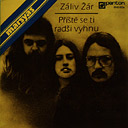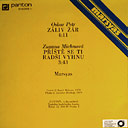Marsyas – Záliv Žár
from 7 inch SP, 1979, Panton 81430006
arranged by Michael Kocáb


original SP sleeve (front/back, l. to r.: Petr, Michnová, Kalandra)
Marsyas started in the early 1970s as a folk duo of singer Zuzana Michnová with Petr Kalandra on guitar, harp and vocals. Soon they teamed up with the talented singer/songwriter, guitarist, photographer and painter Oskar Petr. After recording a “conservative” folk single and touring with Jazz Q and Pražský výběr, by 1977 they were ready for their debut long player. For the self-titled album they decided to present their folk repertoire in adequate new clothes, so the producer Hynek Žalčík brought them Pavel Fořt’s studio group Labyrint. The line-up reads like a who-is-who in Czech jazz and rock music: besides guitar player Fořt (Karel Gott orchestra, ex-Flamengo) there was the original Pražský výběr rhythm section Kocáb/Soukup/Malina, another ex-Flamengo Jan Kubík on sax and flute, jazz keyboarder Emil Viklický and the ubiquitous percussionist Jiří Tomek, among others. The result was a timeless blend of folk rock with progressive and funky jazz rock. In the late 1970s the Marsyas members also appeared on other jazz and rock records as guests musicians, e.g. with Pražský výběr (album Žízeň/Thirst), Jiří Schelinger, Vladimír Mišík, Helena Vondráčková or Jazz Q.
Oskar Petr’s Záliv Žár (Heat Bay) has been released in 1979 as a 7″ single after he had already left Marsyas. With its rich string orchestration arranged by classically educated Michael Kocáb the song sounds quite depressing, sort of reflecting the unpleasant era of an escapist society in the midst of the normalization. The main theme is carried by Kocáb’s funky clavinet vamp, augmented by sleazy synthesizers while Oskar sings about birds of passage flying over deserts and oases. Only occasionally the dark mood is broken by a short optimistic but wordless bridge with Zuzana’s angel-like voice. The dramatical section in the middle of the song isn’t much fun either: “In the Heat Bay the sun is merging with the water, I’m scared that it will fall over, almost as it would be drinking for the very last time” – followed by Kalandra’s bluesy harp solo.
The exact line-up of the backing group is unknown to me, but according to Oskar Petr (as he recently replied to my question on his web site), the group and orchestra were overdubbed to the vocal/guitar basic tracks. Quite impressive. Thus most likely we’re hearing Pražský výběr in its pre-new-wave line-up with Ondřej Soukup on bass and either Ladislav Malina or Vratislav Placheta on drums.
After a short period of performing as the Jazz Q’s lead singer, in 1979 Oskar Petr exiled to the USA. As it was a common rule in such a case then, most records mentioning him as a performer or songwriter disappeared from the store shelves and from radio airplay. Zuzana Michnová kept Marsyas alive for almost another decade as a groovy folk rock combo, in some songs partly anticipating Galliano‘s or Urban Species‘ acid-jazz/folk-rock fusion by more than ten years. Kalandra left the group in 1984 and passed away in 1995, after being seriously ill for a couple of years. Meanwhile, another edition of Marsyas came to life in 2004-2005, albeit without Petr.
So, here you have one of my most favorite Czech songs of all times. It took me about 20 years to locate a dusty copy of this particular vinyl single which I only used to know from a tape I once got from my uncle. While in the meantime all 1990s CD reissues have been deleted from the catalogues again, this masterpiece is still available on a recent best-of-CD Marsyas 1978-2004. A second reissue of the debut album – with Záliv Žár as one of the bonus tracks – is also planned and the CD is available for pre-order. So go and get it now! You can listen to audio samples of all Marsyas songs on their web site. Vinyl is available on gemm.com, musicstack.com or occasionally on eBay. That aside, I also have two Marsyas vinyl records for sale (items no. 20 and 23 in my list) from the late 1980s. But well, that’s already that typical 80s drum machine pop rock…
In the Heat Bay
Posted in Funky Czech-In
3 Comments
Comments are closed.

Pingback:Rings on the water – Funky Czech-In
Pingback:Blues in soul – Funky Czech-In
Pingback:The racer – Funky Czech-In